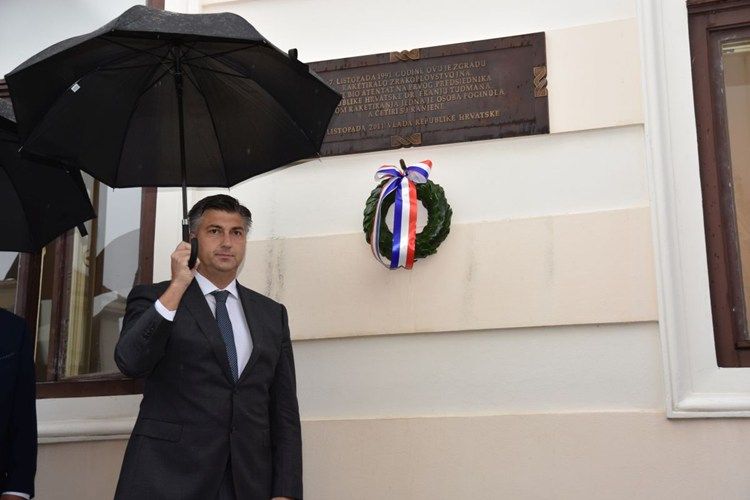On 7 October 1991, JNA aircraft attacked the Banski Dvori Palace.
On Friday, Croatian Prime Minister Andrej Plenković laid a wreath on a memorial plaque at the Banski Dvori Palace, which is now the seat of the Croatian government. The occasion was the 26th anniversary of the rocket attack on the building, which at the time housed the offices of then Croatian President Franjo Tuđman, who was unhurt in the attack, reports tportal.hr on October 6, 2017.
“Today, we are here to remember 7 October 1991, when aircraft of the JNA launched a rocket attack on the Banski Dvori Palace, on the eve of the Greater Serbian aggression against the Republic of Croatia,” said Plenković.
In addition to President Tuđman, other high officials were also presented in the building at the moment of attack, including Stipe Mesić, at the time a close Tuđman’s associate and later successor as Croatian President, and Ante Marković, who was at the time Yugoslav federal prime minister. They were also unhurt.
Of the six missiles fired, two hit the palace, and the attack was assessed to be an assassination attempt against Tuđman. One person was killed in the attack, and four were injured. The building itself was heavily damaged, especially the roof and many of the interior rooms.
The JNA attacked the Banski Dvori Palace at the time when its aggression spread to almost the whole of Croatia and when the European Community’s three-month moratorium on the declaration of independence proclaimed in June by the Croatian Parliament was about to expire. The European Community still believed that the Yugoslav crisis could be resolved peacefully.
After the attack, the Office of the President was moved to the former Yugoslav President Tito’s residence in the Pantovčak neighbourhood, where it is still located. The Banski Dvori Palace was later renovated, and the government moved its headquarters there.

Plenković said that the attack was another “reference moment which accelerated the process of independence of Croatia and its international recognition.” The day after, on 8 October, the first convocation of the Croatian Parliament made a historical decision on independence, which is now celebrated as the Independence Day.
Today’s ceremony was attended by Deputy Prime Minister and Minister of Economy, Entrepreneurship and Craft Martina Dalić, Deputy Prime Minister and Minister of Foreign and European Affairs Marija Pejčinović Burić, Deputy Prime Minister and Defense Minister Damir Krstičević and Interior Minister Davor Božinović.
The ceremony was held a day ahead of the anniversary due to Prime Minister Plenković’s trip to Rome, where he will meet with Pope Francis tomorrow.
Translated from tportal.hr.


